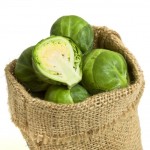 Please Pass the Brussel Sprouts
Please Pass the Brussel Sprouts
Now while I’ve yet to visit Brussels, Belgium, this I know: THEIR SPROUTS ROCK!
But I did not always feel this way; trust me.
In the past, the sulfur-like, rotten egg smell of overcooked (usually boiled) Brussel sprouts would have me saying a quick “No thanks” anytime I was offered them. But over the last few years I have taken quite a shine to this vegetable which resembles mini heads of cabbage.
So what happened between then and now? I’ll tell you what—I learned how to cook them to bring out their best characteristics: taste and nutrition, while avoiding their potentially worst characteristic—their off-putting smell.
Brussel sprouts are an extremely healthy choice when looking to complement a main course protein. They hail from the cruciferous vegetable family which makes them a close cousin to cabbage, collard greens, broccoli, and kale. As cousins, Brussel sprouts contain all the same wonderful anti-aging, cancer-preventive elements that their other family members do. Plus Brussel sprouts are particularly high in vitamins K and C!
When purchased, good quality Brussels sprouts should be firm/compact, free from pin holes (aphid problem), and be vivid green in color. Give ‘em a quick rinse and then halve or quarter them (depending on size) with a sharp knife and they will be ready to cook.
My favorite method of preparing Brussel sprouts is to roast them. Plain and simple, I toss them in some extra virgin olive oil, salt and pepper, spread them out on a baking sheet with some “elbow room” and bake them at 350°F for 30-45 minutes (for halved sprouts, less time for quartered). This method of cooking caramelizes and crisps the sprouts in a divine way.
Try them—you’ll think you died and went to Belgium!